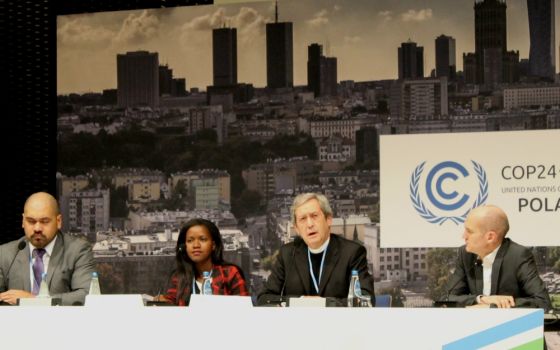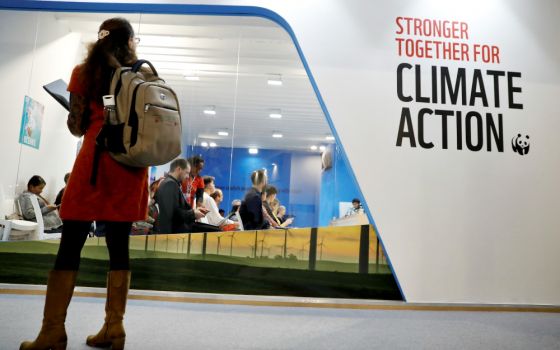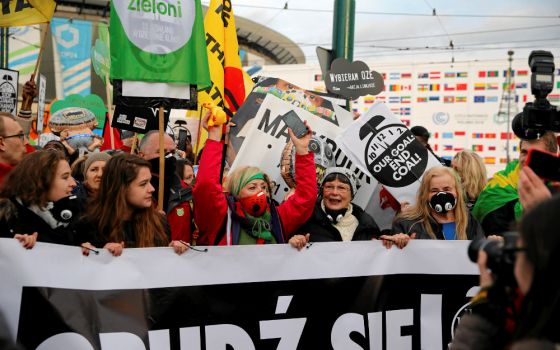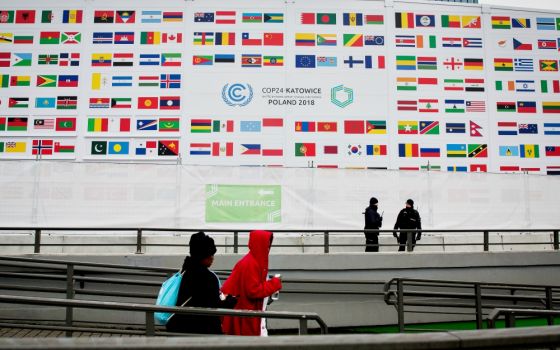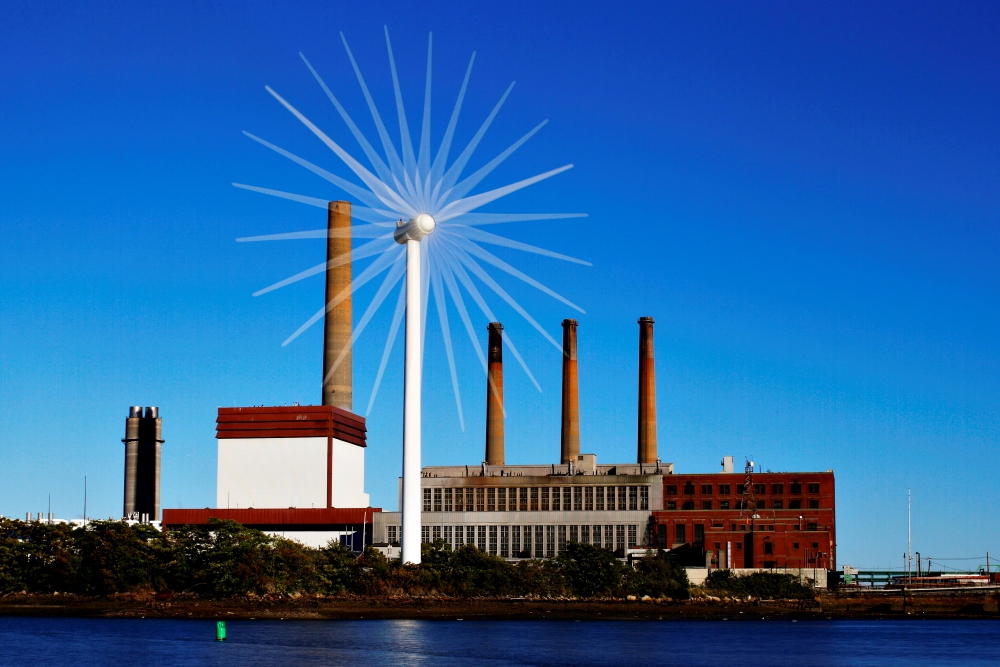
A wind turbine turns in front of a fossil fuel power plant in Charlestown, Mass., in 2013. (CNS/Reuters/Brian Snyder)
As federal steps to curb climate change wane in the United States, a new campaign looks to add a loud and broad Catholic voice to a nationwide reassertion of American commitment to the international pact to address a warming world.
The Catholic Climate Covenant officially launched on April 25 the "Catholics Are Still In" campaign to assemble church institutions behind a united Catholic Climate Declaration advocating for U.S. action on climate change and support for the Paris Agreement despite the Trump administration's plans to exit the deal.
"As Catholic communities, organizations, and institutions in the United States, we join with state, tribal, and local governments, as well as businesses, financial institutions, and other faith organizations, to declare that we are still in on actions that meet the climate goals outlined in the Paris Agreement," the declaration reads.
It continues: "Climate change is an urgent moral issue because it compromises the future of our common home, threatens human life and human dignity, and adds to the hardships already experienced by the poorest and most vulnerable people both at home and abroad. We teach that governments exist to protect and promote the common good, and that 'the climate is a common good, belonging to all and meant for all,' " referencing a passage from Pope Francis' 2015 environmental encyclical "Laudato Si', on Care for Our Common Home."
The Paris Agreement, adopted in the French capital in December 2015 at the COP21 United Nations climate summit, committed all nations to take steps to reduce their greenhouse gas emissions — the primary driver of climate change — toward the goal of holding average global temperature rise "well below" 2 degrees Celsius (3.6 degrees Fahrenheit) or as low as 1.5 C (2.7 F).
That threshold is the point scientists predict the effects of climate change, among them increased droughts, wildfires, intense flooding and extreme weather events, will become most extreme and likely irreversible. A study released April 25 funded by the U.S. military concluded that more than 1,000 low-lying islands could become "inhabitable" by midcentury or sooner due to rising sea levels.
The Catholics Are Still In campaign is coordinated by Catholic Climate Covenant and its partner members, which include the U.S. Conference of Catholic Bishops. The campaign seeks to gather through June 11 thousands of signatures from the nation's dioceses, parishes, congregations and offices of Catholic organizations. The Catholic Climate Covenant will then announce the final count around June 18, the third anniversary the release of Laudato Si'.
"We are strongly calling for nonpartisan dialogue and approaches to climate change. To really ending the partisanship about this, because it is about care for creation, care for our future, care for our common home, care for the most vulnerable," Jose Aguto, Catholic Climate Covenant associate director, told NCR.
The Catholics Are Still In campaign aligns with the broader "We Are Still In" coalition that formed among cities, states and a multitude of organizations and businesses in the wake of President Donald Trump's announcement last June that he would withdraw the U.S. from the Paris Agreement at the earliest opportunity.
Under the terms of the Paris Agreement, a nation cannot formally announce its intention to leave the agreement until three years after its ratification date, Nov. 4, 2016, with the withdrawal process taking effect a year later. That timeline places the earliest date for a U.S. exit at Nov. 4, 2020 — the day after the 2020 presidential election.
Should the U.S. formally leave the Paris Agreement, it would stand as the only nation outside the deal, originally signed by 195 nations and so far ratified by 175.
Since the launch of We Are Still In, more than 2,700 governors, mayors, university presidents, and business and faith leaders, representing 158.8 million Americans, have signed onto that declaration. As part of Earth Day celebrations, the We Are Still In coalition launched a "We Are Taking Action" campaign to drive efforts to address climate change ahead of the Global Climate Action Summit in San Francisco in September.
Plans are underway for a Catholic and faith-based event during the summit to highlight steps taken by religious communities.
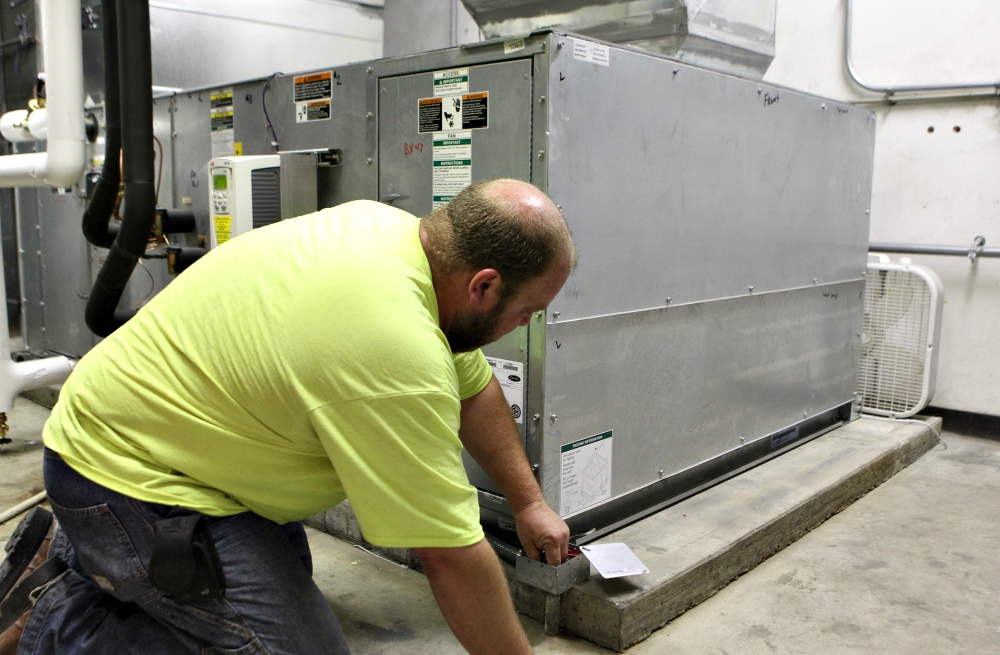
Technician Brian Wayson of AirStream Mechanical in Cincinnati checks wiring on a high-efficiency air conditioning unit at St. John Fisher Church in Newtown, Ohio, Aug. 17. Retrofitting the unit was one part of a continuing effort under the Catholic Energies program to help Catholic facilities and other entities reduce energy consumption. (CNS/Dennis Sadowski)
After the June announcement, Catholic Climate Covenant will turn attention to asking the signatories to pledge steps toward reducing greenhouse gas emissions in their own institutions. Its Catholic Energies program has already begun working with dioceses and parishes in exploring ways to reduce their energy use and reliance of emissions-producing fossil fuels.
"We hope that the Catholic community will also make those tangible commitments as part of this effort," Aguto said.
For now, though, the focus is on gathering Catholic groups in solidarity.
In mid-April, three bishops — Archbishop Timothy Broglio, chair of bishops' Committee on International Justice and Peace; Bishop Frank Dewane, chair of the Committee on Domestic Justice and Human Development; and Bishop Richard Pates, episcopal liaison to the Catholic Climate Covenant — wrote a letter to all bishops asking them to sign their dioceses to the declaration, and to promote the campaign among Catholic organizations and ministries in their dioceses.
Already, numerous bishops have taken up the invite, including the archdioceses of Atlanta, Indianapolis, Miami and Newark, New Jersey, along with the dioceses of Duluth, Minnesota, and Fort Wayne-South Bend, Indiana.
In addition, Pates wrote a separate letter mailed to each of the 28,000-plus Catholic organizations listed in the Official Catholic Directory asking for their support.
"This declaration is a distinct Catholic expression in support of the We Are Still In campaign. The Catholic Climate Declaration expresses the moral imperative to protect and promote human life and human dignity, the poorest and most vulnerable peoples, and our common home," wrote Pates, retired bishop of Des Moines, Iowa.
He also cited the U.S. bishops' 2001 document "Global Climate Change: A Plea for Dialogue, Prudence, and the Common Good," where they stated, "At its core, global climate change is not about economic theory or political platforms, nor about partisan advantage or interest group pressures. It is about the future of God's creation and the one human family. It is about protecting both 'the human environment' and the natural environment. It is about our human stewardship of God's creation and our responsibility to those who come after us."
Advertisement
The launch of the Catholics Are Still In campaign came the same day that French President Emmanuel Macron in an address to a joint session of Congress expressed his belief that, "one day, the United States will come back and join the Paris Agreement."
"By polluting the oceans, not mitigating CO2 emissions and destroying our biodiversity, we are killing our planet. Let us face it: There is no Planet B," he said. "On this issue, it may happen we have a disagreement between the United States and France. It may happen, like in all families. But that is, for me, a short-term disagreement. In the long run, we will have to face the same realities. We are citizens of the same planet.
"We have to face it. Beyond some short-term disagreements, we have to work together," Macron said.
On April 30, climate talks are set to open in Bonn, Germany, in preparation for COP24, the annual United Nations climate summit, to be held this year in Katowice, Poland. There, nations will conduct the first global stock-take to gauge progress in meeting their voluntary, self-established climate action plans set in Paris — which, if fully implemented, would hold warming only to 3 C by century's end — and then ratchet up their commitments.
While still holding climate change is a global problem requiring a global solution, the parallel purposes of the We Are Still In and Catholics Are Still In campaigns intend to show that the non-state community isn't willing to wait.
"Our future rests not upon our politics or economics but the degree to which all of us meet the moral call to our neighbors, children, God's creation and our common future," Aguto said.
[Brian Roewe is an NCR staff writer. His email address is broewe@ncronline.org. Follow him on Twitter: @BrianRoewe.]




